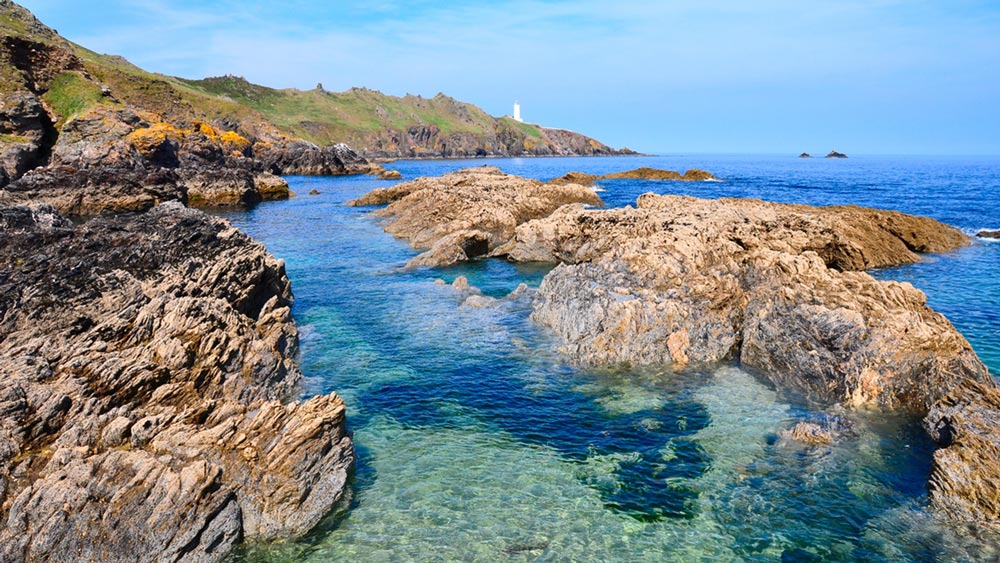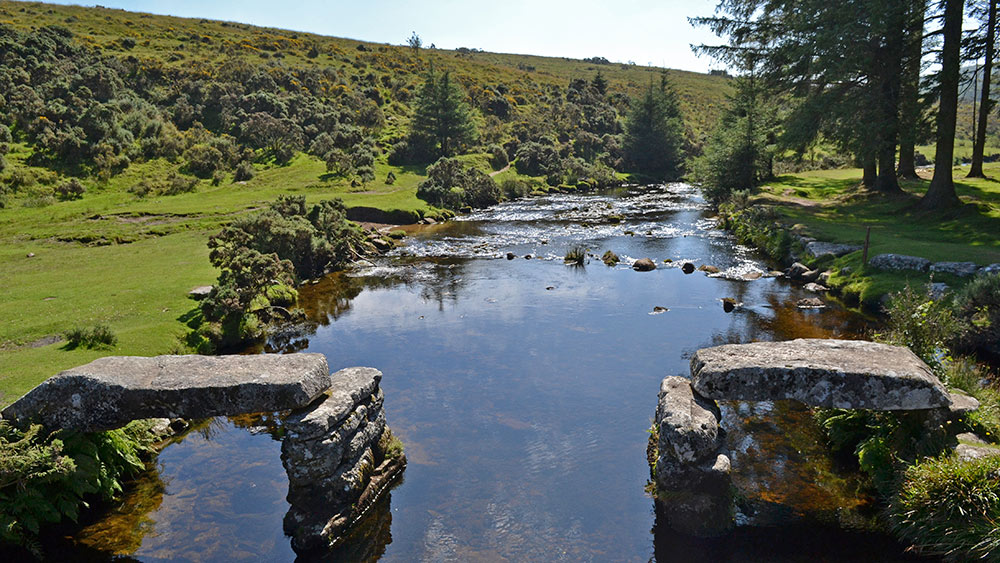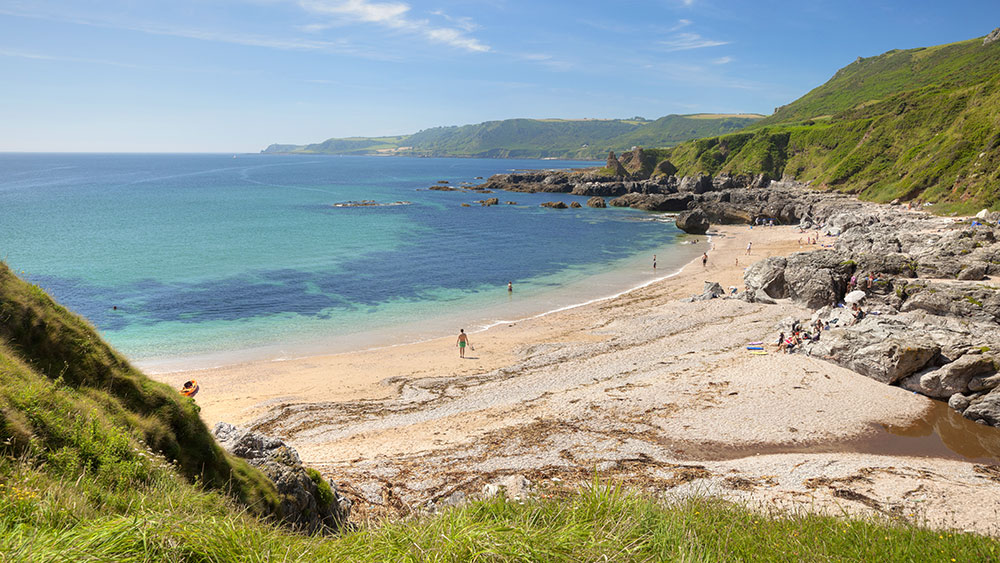Q & A with Wild Swimmers Matt Newbury and Sophie Pierce
The secret coves, wending riverways and tranquil pools of the West Country continue to enchant all those who thrive on the rush and euphoria of wild water.
Basking in this natural beauty and seeking out uncharted aquatic experiences are two of the region’s most prolific wild swimmers. No one knows the craggy shores and secret backwaters of Devon and Cornwall better than Matt Newbury and Sophie Pierce, whose combined passion for wild swimming has not only inspired others to embrace this exhilarating pursuit, it’s also seen them publish two insightful guidebooks on the subject.
We were thrilled to land an interview with this intrepid duo, and who better to pitch the questions than our very own in-house amphibian, the lovable Mr Toad.

An interview with wild swimming enthusiasts and authors, Matt Newbury and Sophie Pierce…
Mr Toad: Great to meet a couple of fellow water-wallowers. How would you best describe wild swimming?
Sophie: It’s swimming in natural water – whether sea, river or lake. It’s a beautiful way to immerse yourself in nature, it’s a different way of experiencing the natural world.
Mr Toad: How did it become your passion?
Sophie: Ever since I was a child I loved swimming, exploring caves on Cornish holidays, and swimming in our local river. It’s a lifelong thing.
Matt: I grew up by the sea in Teignmouth and have always loved to swim, as I’ve got older it’s become a great way of keeping fit and feeling alive.
Mr Toad: Could you help explain the restorative powers of wild water?
Sophie: For me, it’s a way of ‘zeroing in’ on myself. When I enter the water, I leave everything behind and enjoy being in the moment; when I come out, I feel ready to face the world!
Matt: It just makes you feel really good, alive!
Mr Toad: GPs have been prescribing cold water swimming to help treat anxiety and depression. Does this come as any surprise to you?
Sophie: Not at all, there is something very restorative about clean, natural water. When you swim in it, it is almost as though you are going back to some sort of primitive state. That is very therapeutic.
Matt: No, in fact this is nothing new, many people with disabilities were sent to the Devon coast during the 18th and 19th centuries for sea cures.

Mr Toad: How important is it for human beings to stay connected with nature?
Sophie: In our increasingly busy lives, staying connected with nature helps us keep our perspective.
Matt: We can become all too addicted to our phones, computers and TVs; wild swimming takes you away from all that and helps clear the mind.
Mr Toad: Is it more common for people to discover wild swimming while on holiday?
Sophie: Yes, because you have more time on holiday, and you are more inclined to try new things. Also, the landscape on holiday is usually more inspiring or beautiful than at home.
Matt: Yes, it is wonderful to have time to explore new places.
Mr Toad: What inspired you to write about your experiences?
Sophie: We wanted to share the joy of wild swimming and to share some of the wonderful places we have here in Devon.
Matt: We both share a passion for writing, so combining that with something we love doing was the obvious thing to do.
Mr Toad: What can wild swimmers do to help the campaign against plastic pollution?
Sophie: Take any plastic home and take a bag with you to clear up other people’s mess that you may find.
Matt: Try not to use plastic in the first place; take a reusable mug with you on your travels for example, and carry a water bottle which you can fill up as you go, rather than buying plastic bottles of water.

Mr Toad: Where’s the most unusual place you’ve enjoyed a wild swim?
Sophie: Loch Meall an t-Suidhe, which is the highest swimmable body of water up the highest mountain in the UK – it’s a lake halfway up Ben Nevis that was extremely cold!
Matt: The Red Light District in Amsterdam!
Mr Toad: Have you had many close encounters with the local wildlife?
Sophie: Lots! I’ve been very close to seals in the sea and been ‘bumped’ by them a couple of times. I see lots of fish in the River Dart, everything from minnows to sea trout. I’ve seen kingfishers but never an otter.
Matt: Like Sophie, encounters with seals in Devon are a regular occurrence.
Mr Toad: If you had to pick out one particularly memorable wild swimming spot in South Devon, where would it be and why?
Sophie: I love the little secret beach down at Pear Tree Point just west of Start Point. There is a lagoon with a cave, and a seal colony on the island just offshore.
Matt: Bow Creek near Totnes is a great place to swim on a high tide; it’s a hidden creek off the Dart estuary, plus there is also a very nice waterside pub for afterwards.
Mr Toad: Could you share some essential safety tips for all those new to wild swimming?
Sophie: Don’t go alone, don’t swim after drinking alcohol, never jump or dive in without checking the depth and use goggles to check there are no obstructions under water.
Matt: Always work out how you are going to get out.
Thank you, Sophie and Matt, for sharing your wisdom and experiences about wild swimming. Their second book, Wild Swimming Walks: Dartmoor and South Devon is published by Wild Things Publishing ; their earlier book, Beyond the Beach: the Secret Wild Swims of Torbay has just gone out of print, but watch their website for news of a reprint.
Why not take the plunge during your next holiday in the West Country? Dive in to our list of holiday cottages Devon, Cornwall and Dorset and start searching for your perfect holiday cottage.
